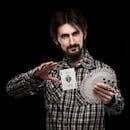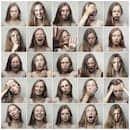Home
3 Best Card Tricks for New Magicians
Learn Mentalism Magic Tricks a Comprehensive Guide

Unveiling the Origins of Renowned Magic Tricks
Understanding the Impact of 20th Century Magicians

Why Knowing Magic Trick Secrets Enhances Performances

Fresh Guide Dazzling Party Magic Tricks Revealed

Four Simple Magic Trick Techniques for Kids

Learn Advanced Sleight of Hand Magic Tricks a Guide

Molly Witch Does Magic Tricks

Can You Ace Our Art of Magic Tricks Quiz?

Top 5 Local Schools for Magic Trick Performances

Is 777 a Lucky Number?

Magic tricks you can do over text

Unlocking the Enigma: Performing Magic Tricks Explained

How does a magician levitate?

How much is a Charlie McCarthy ventriloquist doll worth?

Which of these stars made his fortune doing magic tricks?

How do magicians guess what you’re thinking?

Penn And Teller Bullet Catch Explained

What do you mean by ventriloquist?

How much is a Howdy Doody Ventriloquist doll worth?

Is Christopher Guest a ventriloquist?

What is the fear of ventriloquist dummies called?

Where did the phrase Plunk your magic twanger Froggy come from?

Why are magic tricks Haram?

How old is ventriloquist Ronn Lucas?

How many ventriloquist are in the world?

What disorder does the ventriloquist have?

Is Lisa Whelchel a ventriloquist?

What happened while Ethan was doing a ventriloquist act for Britney?

Is Willie Tyler The ventriloquist still alive?

Is Diedrich Bader a ventriloquist?

Is Robbie really a ventriloquist on Victorious?

Who Was the Ventriloquist With the Old Man?

Is Merlin Gene a Ventriloquist?

What Is the Ventriloquist Mouth Position?

How Does a Ventriloquist Make the B Sound?

Who Was the Ventriloquist With Danny O Day?

Who Was the First Black Ventriloquist?

Is Steve Axtell a Ventriloquist?

Which Ventriloquist Had a Bear?

What Is the Fear of Ventriloquist Dolls Called?

Is Bernadette Actually a Ventriloquist?

Where Is the Vent Haven Ventriloquist Museum Located?

What Show Was the Lester Ventriloquist?

What Was the Name of the Ventriloquist Doll in Goosebumps?

How Do You Make a Ventriloquist Puppet Out of Paper?

